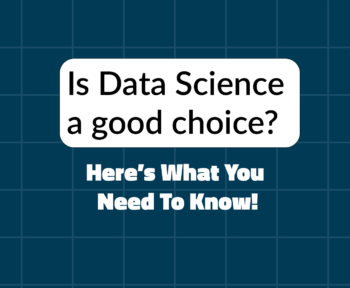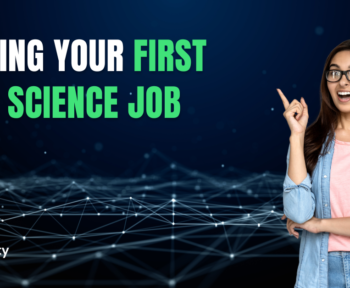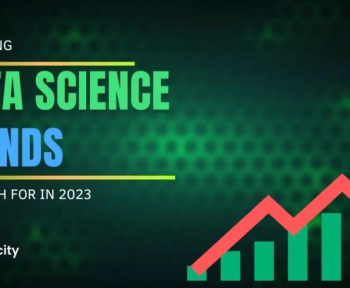In this article we will share wtih you: Tips on How to Ace Data Science Interviews by Industry Experts of Vertocity
Data Science Interviews can be a nerve-wracking experience. Although you may have the necessary technical expertise, you still need to impress the hiring manager with your communication skills and overall impression. In this blog, we will share tips and insights from industry experts on how to ace the data science interview, from preparing for the interview to mastering the technical and behavioral questions.
Following are the tips to follow while preparing for the Data Science Interview
Understanding the Data Science Job Market
Before you begin preparing for your data science interview, it’s essential to understand the current data science job market. Research the industry and job market trends, including the most sought-after skills, qualifications, and certifications. This understanding will help you identify where you stand in the market and tailor your interview preparation accordingly.
According to recent studies, the demand for data scientists has been steadily increasing over the past few years, with no signs of slowing down. In fact, the Bureau of Labor Statistics predicts a 16% growth rate in the field between 2020 and 2030. This growth is due to the increasing need for businesses to make data-driven decisions and the vast amounts of data available for analysis.
Some of the most sought-after skills in the data science interview and job market include proficiency in programming languages such as Python and R, data visualization, machine learning, and statistical analysis. Additionally, having a solid understanding of databases, cloud computing, and big data technologies can set you apart from other candidates.
Researching the Company and Role
Thoroughly researching the company and the role is very crucial before appearing for the data science interview. It shows the hiring manager that you are genuinely interested in the job and have taken the time to learn about the company culture, values, mission, and vision. Use this research to tailor your responses to the company’s specific needs and priorities, which can set you apart from other candidates.
When researching the company, start by visiting their website and social media pages. Look for recent news articles, press releases, and blog posts to get a sense of their current projects and initiatives. You can also use websites like Glassdoor to read reviews from current and former employees and gain insight into the company’s data science interview process.
When researching the role, review the job description and make note of the specific skills and qualifications the company is looking for. Use this information to prepare for potential data science interview questions and to highlight your relevant experience and skills.
Brushing Up on Relevant Skills and Technologies
Next, focus on brushing up on the relevant skills and technologies that the job requires. Review job postings and descriptions to ensure you are familiar with the required programming languages, data analysis tools, and techniques. Practice solving data science problems, develop a project portfolio, and contribute to open-source data science communities to showcase your skills and stay up-to-date with the latest trends.
One way to stay up-to-date with the latest trends is to attend data science workshops and meetups. These events provide opportunities to network with other professionals in the field, learn about new technologies and techniques, and gain insight into industry trends.
Additionally, taking online courses and earning certifications in relevant areas from Vertocity can benefit your candidature before data science interview. Vertocity offers a wide range of courses in data science topics, including machine learning, data visualization, and statistics.
Mastering the Technical Interview
Getting ready for a technical data science interview can be a daunting task, but with the right preparation and mindset, you can ace it. Technical interviews are designed to test your coding proficiency, problem-solving abilities, and data analysis skills. As a data science job candidate, you need to be ready to answer questions that will showcase your expertise in these areas.
Common Data Science Interview Questions
It is essential to review common interview questions to prepare your answers and practice problem-solving consistently before a data science interview. This practice will help you build confidence, become more comfortable with the interview format, and develop a more profound understanding of the skills you need for the job.
Some of the common data science interview questions include:
- What is your experience with data cleaning and preprocessing?
- How do you handle missing values in a dataset?
- What is your experience with data visualization tools?
- How do you approach a data analysis project?
- What is your experience with machine learning algorithms?
Demonstrating Your Coding Proficiency
Most data science interviews involve a coding challenge or exercise. Approach these coding challenges with a structured problem-solving mindset, write clean and efficient codes, and focus on code readability and good style. Practice coding challenges repeatedly, obtain feedback from peers, and experiment with new problem-solving techniques to master your coding abilities.
Some of the coding challenges you might encounter in a technical data science interview include:
- Implementing a sorting algorithm
- Creating a function to calculate the mean, median, and mode of a dataset
- Building a recommendation system
- Creating a neural network
Showcasing Your Data Analysis and Visualization Skills
Data visualization is an essential part of every data scientist’s job. Focus on preparing for interview questions that test your data visualization skills, understand visualization techniques such as Matplotlib, Seaborn, ggplot2, and practice creating visualizations from scratch. Set up a data cleaning pipeline, develop data processing functions, and implement data pipelines that can analyze and visualize visualization objectives.
Some of the data analysis and visualization skills you might be tested on in a technical data science interview include:
- Creating a scatter plot, line plot, or bar chart
- Building a heat map or a choropleth map
- Visualizing data distributions using histograms or density plots
- Creating interactive visualizations using tools like D3.js or Plotly
Remember, the key to mastering a technical data science interview is practice and preparation. By reviewing common interview questions, practicing coding challenges, and honing your data analysis and visualization skills, you can demonstrate your expertise and land your dream data science job.
Acing the Behavioral Interview
As a data science professional, you know that the behavioral interview is a critical step in the hiring process. This type of interview is designed to evaluate your soft skills, such as your ability to work in teams, solve problems, and communicate effectively. It may seem daunting, but with the right preparation, you can impress the hiring manager and land your dream job.
Highlighting Your Soft Skills
Soft skills are essential for data science professionals, and the hiring manager will be assessing your ability to work with others, communicate effectively, and think critically. To prepare for this, think about specific examples of times when you demonstrated these skills. For example, you could talk about a project where you collaborated with a team of analysts to solve a complex problem. Or, you could discuss how you presented complex analytical insights to non-technical stakeholders in a way that was easy for them to understand.
Remember, the key to highlighting your soft skills is to provide specific examples that demonstrate your abilities. Don’t just say that you’re a good communicator – provide an example of a time when you effectively communicated a complex idea to someone who didn’t have a technical background.
Discussing Your Data Science Projects and Experience
Your previous data science experience and projects can demonstrate your capabilities and differentiate you from other candidates. When discussing your experience, be sure to provide specific details about the projects you worked on, the programming languages and data analysis tools you used, and the analytical insights you gained. This will help the hiring manager understand your level of expertise and the impact you can have on their organization.
It’s also important to discuss the impact of your work. Did your analysis lead to a significant increase in revenue? Did it help the company make a critical business decision? Providing concrete examples of the impact of your work will help the hiring manager understand the value you can bring to their organization.
Answering Behavioral Questions with the STAR Method
Behavioral interview questions are designed to assess your past behavior and predict your future performance. To answer these questions effectively, it’s important to use the STAR method.
The STAR method is a framework for answering behavioral interview questions. It stands for Situation, Task, Action, Result. Here’s how it works:
- Situation: Describe the situation you were in.
- Task: Describe the task you were given.
- Action: Describe the actions you took to complete the task.
- Result: Describe the results of your actions.
Using the STAR method will help you provide a structured and concise answer to behavioral interview questions. It will also help you highlight your role in the situation, the task you were given, the actions you took, and the results you achieved.
Remember, the key to acing the behavioral interview is preparation. Practice answering behavioral interview questions using the STAR method, and be sure to provide specific examples that demonstrate your skills and expertise. With the right preparation, you can impress the hiring manager and land your dream job in data science.
Post-Interview Best Practices
Interviews can be nerve-wracking, but following up after the interview can help you stand out from the other candidates. Here are some best practices to keep in mind:
Sending a Thank You Note
After the interview, it’s essential to follow-up with the hiring manager and the recruitment team members to thank them for their time. This step demonstrates that you are genuinely interested in the role and can serve as a way to emphasize specific aspects of the interview that you felt went well.
When crafting your thank you note, it’s important to keep it brief but thoughtful. Thank the interviewer for their time and consideration, and reiterate your interest in the position. You can also use this opportunity to highlight any relevant skills or experience that you feel were not fully addressed during the interview.
Remember to proofread your message carefully before sending it. A well-written thank you note can leave a lasting positive impression on the interviewer.
Following Up on the Interview Process
It’s crucial to stay informed of the interview process, including expected timelines, follow-up interviews, and feedback opportunities. Make sure to ask the interviewer about the next steps in the process, and when you can expect to hear back from them.
If you have not received feedback after several days or weeks, reach out to the recruiter to politely inquire about your candidacy status and the next steps in the interview process. This shows that you are proactive and interested in the role.
Reflecting on Your Performance and Improving for Future Interviews
After the interview, take some time to reflect on your performance. Analyze your strengths, weaknesses, and areas of improvement. Think about how you can improve your interview skills for future opportunities.
One way to improve your interview skills is to practice with peers or mentors. Ask them to give you honest feedback on your performance and identify areas where you can improve. You can also research common interview questions and practice answering them in front of a mirror or with a friend.
Finally, it’s important to continuously develop and improve your data science skills. Attend conferences, take online courses, and read industry publications to stay up-to-date on the latest trends and technologies in the field. Continual practice is the key to confidence, mastery, and eventually landing your dream data science job.
Conclusion
Acing the data science interview requires thorough preparation, technical mastery, and excellent communication and collaboration skills, and this guide provides aspiring data scientists with a comprehensive overview of the interview process. With these tips and insights, you can enter the interview room with confidence, impress the hiring manager, and land your dream data science job.





